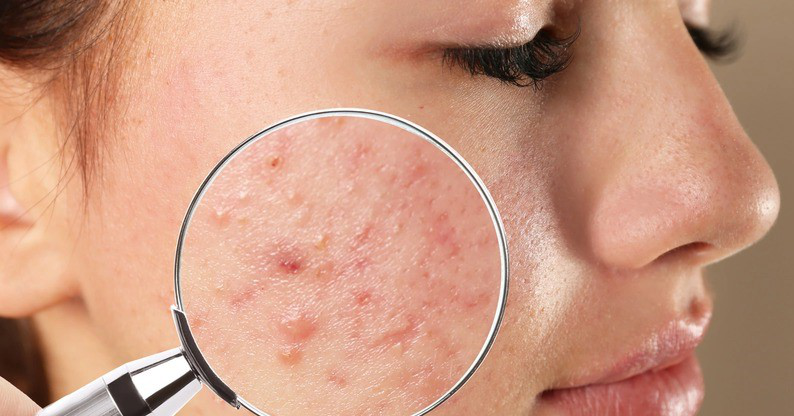Vitamin A is an essential nutrient for health and skin. This vitamin has many important uses in maintaining the appearance and function of the skin such as reducing wrinkles and preventing acne. Let’s learn more about the uses of vitamin A through the article below!
Vitamin A is an important nutrient that can be absorbed through food, vitamin supplements, or using topical products. Vitamin A has many significant effects, and can even be used to control a number of different skin problems, such as acne, psoriasis.
Vitamin A helps prevent premature aging
Vitamin A and its derivatives such as Beta-carotene and Carotenoids Provitamin A are truly powerful “allies” in the fight against premature skin aging. Studies have shown that, when provided adequately through the diet, these compounds will maximize their antioxidant capacity.

Vitamin A has many miraculous effects on the skin.
Specifically, oxidative free radicals are one of the main causes of premature aging and wrinkles on the skin. These free radicals can attack and destroy collagen fibers and elastic cartilage in the skin, causing the skin to lose its firmness and smoothness. However, when Vitamin A and Carotenoids are absorbed into the body, they will participate in the process of neutralizing and destroying these free radicals effectively. Thanks to that, they prevent premature aging, helping the skin to stay smooth and youthful.
In addition, Vitamin A also stimulates skin cell regeneration, promotes metabolism and restructures important components of the skin such as collagen and elastin. From there, the skin is improved in both elasticity and firmness, thereby minimizing signs of premature aging such as wrinkles and sagging.
Vitamin A protects the skin from sunlight
Vitamin A also has the effect of protecting the skin from the harmful effects of UV rays from sunlight. Consuming adequate amounts of Vitamin A can make the skin less sensitive to sunlight and protect the skin from sunburn and melasma.
Promotes cell regeneration
Vitamin A is an important nutrient that plays a key role in skin health and beauty. Forms of Vitamin A such as Retinol and Retinoic Acid, through metabolism, actively contribute to promoting the growth and regeneration of healthy skin cells.
Specifically, Vitamin A stimulates the growth and development of fibroblast cells, while promoting tissue regeneration. This helps to strengthen and reinforce the outer epidermis of the skin, enhancing its ability to resist harmful agents such as bacteria, infections and environmental pollution. In addition, Vitamin A also plays an important role in maintaining skin moisture and elasticity, preventing dry and itchy skin.

Vitamin A supports skin cell regeneration
On the contrary, a deficiency of Vitamin A can lead to many skin problems such as slow wound healing, dry skin, sensitivity and more vulnerable to environmental influences. Therefore, proper and adequate Vitamin A supplementation is essential to maintain the health and beauty of the skin.
Reduce and smooth wrinkles
Some over-the-counter (OTC) skin care products and creams prescribed by dermatologists contain Retinol (Vitamin A) used in topical form. Retinol and Retinoic Acid are ingredients that have been proven to fight the signs of premature aging, stimulating the creation of new cells and collagen. These ingredients can be broken down by external factors such as UV rays and pollution.
Brighten and even out skin tone
Using creams containing Vitamin A can help reduce pigmentation and give the skin a bright appearance. These products promote cell turnover, removing dead and damaged cells. New, healthier cells are revealed on the surface, evening out skin tone.
Retinoids in Vitamin A creams act as inhibitors of melanin production, the pigment that determines skin color, and promote skin cell turnover. Therefore, retinoids can help improve hyperpigmentation, freckles, age spots, and sun spots, leaving your skin brighter and smoother.
Control and eliminate acne
Acne is caused by clogged pores, bacteria, excess sebum, and dead skin cells. Clogged pores are where acne-causing bacteria, Propionibacterium Acnes, can grow, leading to acne and blemishes. Creams containing Vitamin A stimulate cell turnover and slow down oil production, preventing acne formation.

Vitamin A helps prevent and eliminate acne
According to the American Academy of Dermatology, Retinoid creams and ointments can help reduce acne and prevent recurrence, because they have anti-inflammatory properties. Retinoids can also help remove dead skin cells, preventing the recurrence of clogged pores. According to research, topical Retinoids are effective in treating acne in adolescents and adults.
Retinoids also penetrate the skin’s surface to stimulate the production of Collagen and Elastin, which can help reduce the appearance of pores and acne scars.
So do you know the uses of Vitamin A in reducing wrinkles and preventing acne? In short, Vitamin A plays an important role in the health and beauty of the skin. However, users need to pay attention to follow the appropriate dosage to avoid side effects. With its comprehensive uses, Vitamin A deserves to be one of the indispensable ingredients in skin care products.





